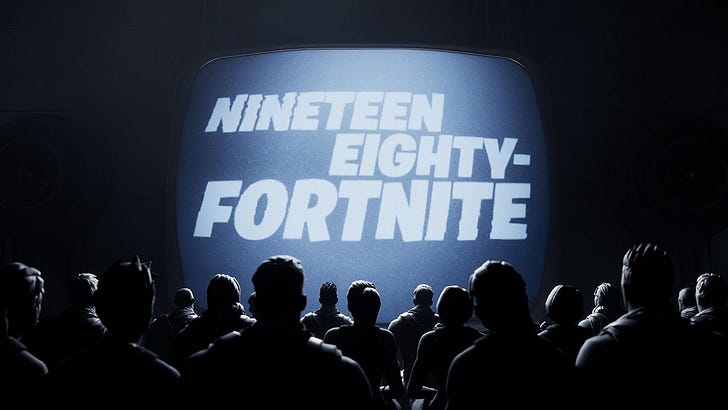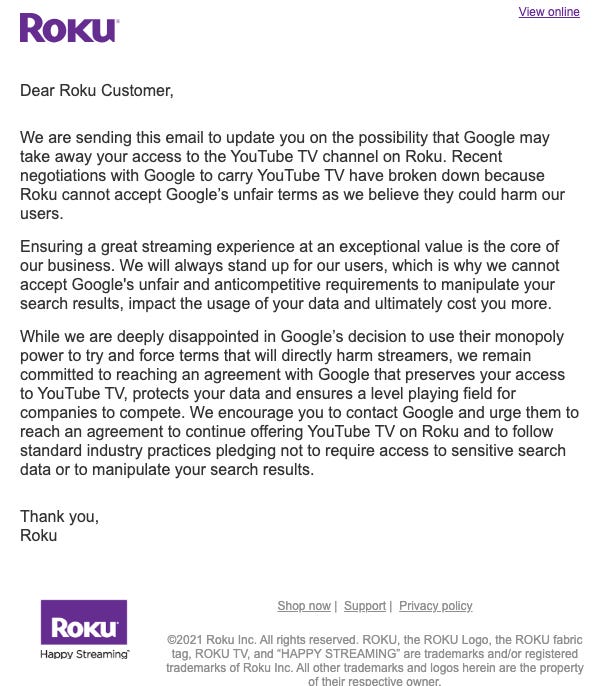Roku, Match Group, and Tile Heat Up the Civil War in American Business
Opponents of the big tech monopolies are coming out in force. Match Group, Tile, Roku, Epic Games, Spotify, and the News Media Alliance are ripping apart the consensus in the business community.
Welcome to BIG, a newsletter on the politics of monopoly power. If you’d like to sign up to receive issues over email, you can do so here.
There’s a civil war in American business, and behind the culture war chatter, that battle is beginning to determine the real movement in politics, which is to say, how money and power are distributed. Take, for instance, what is traditionally considered a question for civil libertarians: free speech. New York Times media columnist Ben Smith just reported on Facebook’s censorship choices, and no civil society group would dare criticize the social media giant. Who did?
The only criticism came from the News Media Alliance, the old newspaper lobby, whose chief executive, David Chavern, called blocking The Post’s link “completely arbitrary” and noted that “Facebook and Google stand between publishers and their audiences and determine how and whether news content is seen.”
On the left side of the aisle, there’s a general belief that businesses are self-interested and malevolent at worst, neutral political actors at best. But this time, it was a lobbyist for newspapers who spoke on behalf of free speech. This choice was in part financial; Chavern is aligned with the free press, in that he works to advance their political agenda. Does that make him a saint? No. But it does make him the only person to go on record with Smith over Facebook’s aggressive policy to structure public discourse, and that is a meaningful moral element when thinking about who stands for the right to express oneself.
Chavern’s stance is not isolated. Chris Hughes, the co-founder of Facebook, is now making it clear that the era of libertarian free market dominance is over, and trust-busting is back. And corporations themselves are now in the thick of the battle. Last August, video game maker Epic Games’s CEO Tim Sweeney kicked off the civil war in American business, suing Apple over its app store monopoly, and doing so in parallel with a massive PR campaign that included a spoof of Apple’s iconic 1984 commercial introducing the Macintosh.
That case is going to trial pretty soon. The judge, Yvonne Gonzalez Rogers, was reading Bork’s Antitrust Paradox before the trial, and the ninth circuit is rough, so she is likely to be hostile to Epic Games. But Tim Sweeney’s attack on Apple has had powerful echoes nation-wide, kicking off political fights everywhere, in states from North Dakota to Arizona, on app store dominance. So far Google and Apple are holding strong, but their castle walls are weakening. Last week, the Senate Antitrust Subcommittee held a hearing on app store monopolies, with Tile, Spotify, and Match Group accusing Google and Apple of extortion and intimidation. That hearing was just brutal for the two app store operators, with Republicans and Democrats both hostile to their power.
Then today, video streaming set-top box maker Roku sent out a note to its customers on hard-ball tactics by Google, explaining why the search giant is pulling YouTube from Roku’s streaming service. Roku asked customers to contact Google, and launched a public relations campaign. Ugly public negotiation over who will carry which content are quite common in the media business as a way to get negotiating leverage. What’s interesting is that Roku is using the monopoly charge against Google as part of this tactic. It claimed to be “deeply disappointed in Google’s decision to use their monopoly power to try and force terms that will directly harm streamers.”
According to Roku, Google demanded a host of concessions that basically boil down to forcing Roku to give special advantages to YouTube. Google denied these claims. And this was done not a note to the press, mind you, but a note to Roku’s own customers. One might also see it as a note cc’d to the Department of Justice Antitrust Division.
Not coincidentally, last week, progressive antitrust rock star Lina Khan had her hearing to be a nominee for the FTC, and she drew praise from both Republicans and Democrats because of her stance on the dominant power of big tech. It’s very uncommon for progressives to draw positive interest from the right, but in the area of trust-busting, it’s increasingly the norm that trust-busters on the right and left are aligning. The rebellion from business leaders frustrated at the dominance of monopolies cutting off their access to markets is one reason why that is so.
We are truly in a brave new world.



Martin Gurri's book "The Revolt of The Public and the Crisis of Authority in the New Millennium" is helpful in understanding why the left and right are joined against the techo-monopolists.
He divides today's world into the Center (government, mainstream media, technology firms, academia, and other organizations used to having near-monopoly power) and the Border, the rest of us.
It is technology that allows the Border every so often (printing press with penny dreadfuls, Internet with blogs) to break free of strictures mandated by the Center. Technology de-isolates members of the Border, allowing them to coordinate their responses. The Center, in reaction to its loss of monopoly, then lashes out.
Seen from this perspective, what is happening today makes perfect sense, whether in politics, technology, and even people's reactions to vaccines.
Judge YGR, who is presiding over the Epic Games v. Apple case, was an Obama appointee, not a Bush appointee.